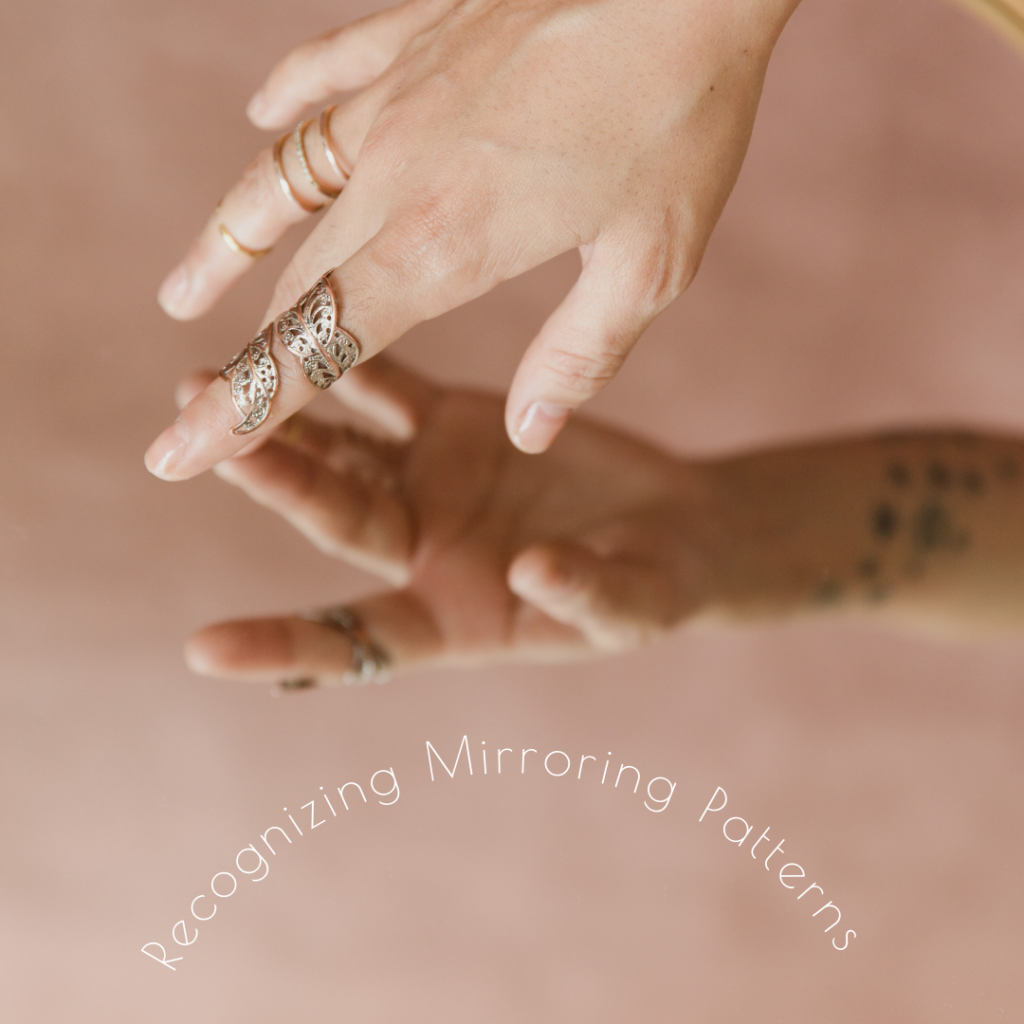Narcissist mirroring manipulation is a form of manipulation often used in abusive relationships. This sneaky tactic involves the abuser copying everything about their victim. They mirror their victim’s interests, desires, and personality traits. It’s a way for the narcissist to win their victim’s trust, only to exploit their vulnerabilities later. So, let’s get a clear picture of what mirroring looks like, understand why abusers resort to this behavior, and highlight how it profoundly impacts the victims’ lives.

Decoding the Narcissistic Mirroring Manipulation Technique
Mirroring is a tricky psychological tactic that manipulative individuals use to create a false sense of belonging and connection with the people they’re trying to control. They do this by closely observing the other person’s likes, dislikes, hobbies, and life goals, then reflecting these aspects back to make it seem like they’re agreeable and empathetic. This mirroring can take different forms and can be both subtle and obvious. It helps the manipulator to craft an illusion of having shared interests and experiences.
Recognizing Narcissistic Mirroring in Relationships
Narcissistic mirroring is a trick narcissists use where they copy or ‘mirror’ the likes, dislikes, behaviors, and wants of the person they’re targeting. This method can make the person feel like they’ve met someone who truly gets them and has much in common.
It's time to reclaim your power, embrace change, and create a life of fulfillment beyond divorce.
Learn More About our Group Coaching Program
Why a Narcissist is Mirroring
- Build a Connection: The narcissist creates a fake bond by mirroring the other person’s values, beliefs, and interests. This makes the person feel a close connection, leading them to trust the narcissist.
- Gain Control: By paying close attention to what the victim wants and needs, the narcissist learns how to manipulate them. This is a form of manipulation narcissists often use.
- Self-Validation: Mirroring serves as a way for narcissists to feed their ego. It reinforces their inflated sense of self-importance and control.
Recognizing When Someone Is Mirroring
- Too Good to Be True: Be wary if you find someone who matches all your interests, beliefs, and values right from the start. This could be a red flag.
- Sudden Changes in Personality or Interests: Narcissists often adopt new hobbies, opinions, or behaviors that mirror their targets.
- Surface-Level Interests: Upon a closer look, you might find that while they say they’re into the same things as you, they might lack a deep or genuine understanding of them.
- A mismatch between Words and Actions: Over time, you might notice inconsistencies between what the narcissist says they value or are interested in and what they do.
- Change in Behavior: Once the narcissist believes they’ve won you over, they might reduce their mirroring and show their true colors more openly.
Why is Recognizing Narcissistic Mirroring Important?
Understanding the narcissistic mirroring tactic is important because it can help you spot warning signs in a relationship early on. Recognizing these manipulative behaviors can enable you to set boundaries, get help, and make smart relationship choices.
It’s worth mentioning that not all mirroring is manipulative. At the start of many healthy relationships, people might unconsciously mimic each other’s body language, ways of speaking or interests to build a connection. What makes narcissistic mirroring different is its motive: it’s about manipulation and control, not real connection and understanding.
Narcissists Use Mirroring as a Manipulation Tactic
Narcissists are skilled at using a variety of manipulative approaches to control and take advantage of others, and one such potent weapon is intentional mirroring. Intentional mirroring goes beyond just passively reflecting another person’s behavior.
It’s a well-thought-out strategy to build a bond, earn trust, and manipulate the person. Let’s dive deeper into how narcissists use intentional mirroring as a form of manipulation:
Building Trust and Connection
Narcissists can develop an instant bond with their target by mirroring their likes, dislikes, behaviors, values, and even body language.
It's time to reclaim your power, embrace change, and create a life of fulfillment beyond divorce.
Learn More About our Group Coaching Program
The person feels validated and understood, thinking they’ve stumbled upon someone who truly understands them.
Narcissists often use this tactic to make you feel that there’s a special bond between you two. This quickly builds trust and intimacy. But beware, this instant connection is often a stepping stone for them to manipulate and control you in the relationship. Recognize these narcissistic behavior patterns in social interactions and establish clear boundaries with such a manipulator.
Gathering Information
Narcissists can learn about your weaknesses and want by mirroring your behavior and feelings. They’ll use this knowledge later to take advantage of you.
Narcissists might slightly tweak the behavior they’re reflecting to see how much influence they have over the you. They’re also testing to see how the person reacts.
Narcissists are good at picking up on your vulnerabilities to devise a personalized strategy for manipulation. They know and exploit your weak points to control or influence your actions. This allows them to push your emotional buttons easily.
Emotional Manipulation
At first, the narcissist’s mirroring gives you a false sense of security and closeness. You might feel like you’ve met someone who gets you and shares your interests.
As things progress, the narcissist’s true colors show, and their actions don’t match their initial behavior. This creates a state of cognitive dissonance for you. The person you thought you knew from the beginning doesn’t seem to be the person you’re dealing with now.
Narcissists use emotional manipulation to keep control and superiority in relationships. They make their targets feel confused and doubtful about themselves, which ensures they stay loyal and dependent.
Control and Dependence
When the target feels a strong tie due to mirroring, they may pull you away from others who could offer a balanced view.
The target grows emotionally reliant on the narcissist, thinking their bond is special and can’t be replicated. This makes leaving or questioning the relationship more difficult for the target, even if it becomes toxic.
Narcissists use control and dependency to keep their power intact. This way, they ensure their needs are always met first, and their frail ego is constantly reassured. By making the person they’re manipulating feel isolated and reliant on them, narcissists can dodge challenges to their authority and self-image.
Shifting the Narrative
When narcissists feel they have enough control, they might start to pull back on their mirroring habits. This sudden change can be quite shocking and confusing for the person on the receiving end. They might find themselves trying even harder to make the narcissist happy and to regain the bond they thought they had.
If the person decides to confront the narcissist about their changing behavior, they might find themselves on the receiving end of gaslighting. This is a form of manipulation used in psychology where the narcissist might make the other person question their memories and how they see things.
Shifting the narrative allows the narcissist to maintain control and keep their target off-balance. By manipulating perceptions and memories, they can evade responsibility and further ensnare their victim in a web of doubt and dependency.
Recognizing and Combating Intentional Mirroring:
It’s crucial to understand your values, boundaries, and warning signs. This insight can help you spot when someone is just mirroring them back to you.
Let it naturally progress in any relationship rather than rushing into a deep emotional bond.
Your trusted friends and family can provide an unbiased opinion about new people in your life. They can help you notice if something doesn’t feel right.
If something seems too perfect or you feel someone isn’t being genuine, trust your gut feeling.
Personal Reflections on Narcissist Mirroring
Looking back on my experiences, I remember a striking example of mirroring. During the rocky relationship with my ex-husband, he often expressed his love for the beach, surfing, and the calm of the waves. I was unknowingly pulled into this mirroring, drawn to his apparent shared love for the sea. We spent many moments together by the seaside, where he charmed me with detailed talks about tide patterns, choosing surfboards, and popular local surfing spots. Now, I realize his declared love for the beach was a carefully created illusion designed to mirror my passions and convince me that we were soulmates.

Understanding the Narcissistic Abuse Cycle: Why Abusers Mirror
Mirroring is a tactic often used by manipulators to gain power and control over their victims. They use it to identify their victims’ weak spots, aspirations, and desires. This lays the foundation of trust that they can exploit later. So, the main reasons behind mirroring are:
Emotional Manipulation
Manipulators often use mirroring to play with their victims’ emotions, creating a misleading sense of closeness. They’re quite adept at modifying their behavior to fit the victim’s wants, earning their trust and making them dependent on the relationship.
Power and Control
Mirroring is a tactic used to control a person’s thoughts, actions, and choices. The manipulator can slowly break down your independence by copying your interests and values. This makes it easier for them to dominate and manipulate the person for their gain.
Securing the Victim
Using the tactic of mirroring, abusers craft a space where their victims feel both understood and validated. This builds a sense of emotional safety, making it harder for the victim to spot the abusive behavior and think about leaving the relationship.
Detecting the Intentional Mirroring Patterns
Knowing common patterns and behaviors associated with this manipulative technique is important to protect yourself from mirroring.
Here’s what to watch out for:
Manipulators often agree too much with your thoughts, ideas, and values, hardly expressing their different views. This gives you the feeling that you two are a perfect match with shared values, leading you deeper into their manipulative trap.
Mirroring usually involves quick changes to match your likes and interests. The manipulator might suddenly take up new hobbies, change their clothing style, or tweak their behavior to meet your expectations. This fast switch can be a warning sign of manipulative behavior.
Mirroring is often a part of the “perfect partner” phase in an abusive relationship. During this phase, the manipulator acts as the ideal partner, showering you with attention, love, and praise. This intense portrayal makes it difficult to spot the abusive behavior that might follow.
Strategies to Break Free from Narcissistic Abuse
Breaking free from the cycle of mirroring and manipulation isn’t easy, but it’s doable. As a divorce coach, providing victims with practical advice and emotional support is one of my first steps to break free from the cycle of abuse.
Here are some important steps victims should keep in mind:
Victims need to learn to trust their instincts and take note of any uneasiness or inconsistencies in their relationships. Overlooking warning signs can extend the cycle of abuse.
Victims should seek help from trusted friends, family, or professionals like therapists, coaches, and support groups. A solid support network can offer validation, direction, and help during healing.
Victims need to concentrate on finding their identity and becoming independent again. This might involve pursuing personal interests, setting clear boundaries, and making decisions that align with their desires, not just trying to make another person happy.
Victims should create no-contact boundaries with their abuser to stop any further manipulation and emotional harm. This could mean blocking phone numbers, email addresses, and social media accounts.

The Devastating Impact on Victims
The effects of mirroring on victims of abuse are profound and long-lasting. As victims invest emotionally in what they believe is a genuine connection, they become increasingly entangled in the abuser’s web of deceit. The consequences may include:
- Emotional Confusion: Victims experience profound confusion and cognitive dissonance as they struggle to reconcile the abuser’s mirroring behavior with their true intentions. This inner conflict can lead to self-doubt, loss of identity, and a breakdown of self-esteem.
- Betrayal and Manipulation: Discovering that the abuser’s mirroring was a calculated trick to use their vulnerabilities can be devastating. Victims often feel a deep sense of betrayal, realizing that the person they thought they knew was simply a disguise.
- Dependency and Isolation: By mirroring the victim’s desires and interests, the abuser encourages a sense of emotional dependence. Victims may find it challenging to detach themselves from the relationship, feeling isolated and unsure of their wants and needs outside the setting of the manipulative dynamic.
The Devastating Impact a Manipulator Has on Victims
Mirroring can seriously harm their victim, leaving deep emotional scars.
Victims can get confused and mixed up. They find it hard to understand why the abuser is acting nice one minute and mean the next. This can make them doubt themselves, lose their sense of who they are, and feel bad about themselves.
When victims find out that the abuser was just pretending to be nice to take advantage of them, it can be a real blow. They feel deeply betrayed, realizing that the person they thought they knew was a mask.
Abusers use mirroring to make victims feel like they need them emotionally. Victims may find it hard to break free from the relationship, feeling alone and not knowing what they want or need without the abuser around.
Narcissists use Mirroring to Manipulate, Mimick and Control
Narcissists use mirroring behavior to create and build rapport and trust. They mirror the victim’s interests, desires, and personality traits, creating a false sense of connection and trust. This leads to emotional entrapment. Understanding why abusers mirror can empower victims to identify and escape abusive relationships.
Mirroring is a manipulative trick that leaves victims lost in a sea of confusion and emotional distress. Understanding this tactic is important to empower people to identify and escape abusive relationships.
Support Offered by My Hidden Scars
At My Hidden Scars, we’re a premier source for divorce coaching and healing solutions. We offer a variety of tools to help you regain your life and bounce back stronger. Our skilled coaches give you personalized advice to help you rely on your instincts, set healthy boundaries, and find yourself again. We know the destructive effects of mirroring and the complex feelings it induces.
You don’t have to face the trials of mirroring and recovery from abuse by yourself. Contact us at 757-414-9178, book a free session, and see how we can assist you in tackling the challenges mentioned in this article.
Remember, with My Hidden Scars, you’re never alone in your journey toward healing and change.







Thank you for all the great information you provide on narcissism. it has been very helpful and I would like to stay onnected. Thanks again, Moana.